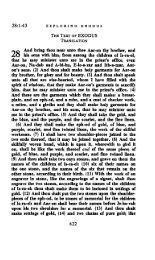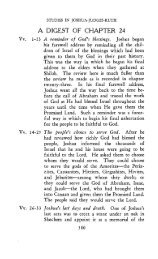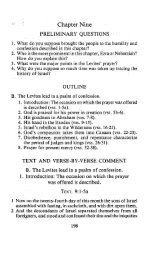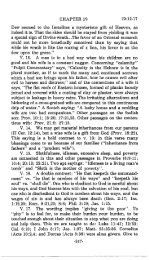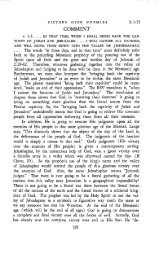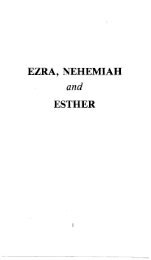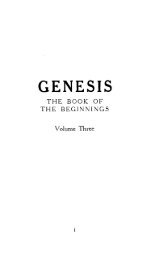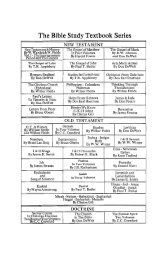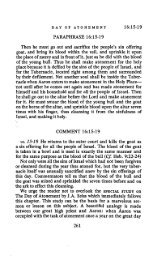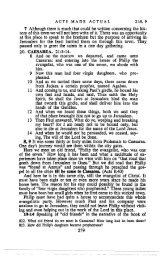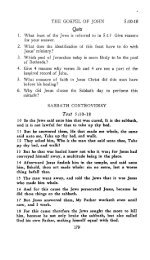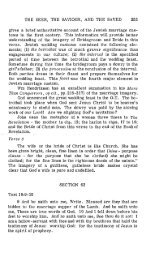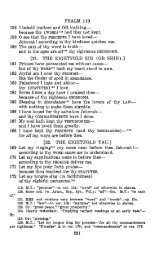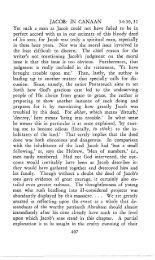Studies in the Psalms Vol 2 Part 2 - Only The Word
Studies in the Psalms Vol 2 Part 2 - Only The Word
Studies in the Psalms Vol 2 Part 2 - Only The Word
Create successful ePaper yourself
Turn your PDF publications into a flip-book with our unique Google optimized e-Paper software.
STUDIES IN PSALMS<br />
be driven to <strong>the</strong> unwelcome conclusion that it is radically and<br />
irremediably <strong>in</strong>coherent; see<strong>in</strong>g especially that such a conclusion<br />
is likely to foster <strong>the</strong> deplorable habit of regard<strong>in</strong>g Holy Scripture<br />
as a, mere fetish, whme chief value lies <strong>in</strong> a mean<strong>in</strong>gless<br />
repetition of sounds <strong>in</strong> which sense is at a discount.<br />
<strong>The</strong> reasons for regarcl<strong>in</strong>g ver. 23 as orig<strong>in</strong>ally cont<strong>in</strong>uous<br />
with ver. 11 will become more and more evident on exam<strong>in</strong>ation.<br />
Not only does <strong>the</strong> personal element <strong>the</strong>n reappear after be<strong>in</strong>g<br />
so long <strong>in</strong> abeyance, but it reappears with <strong>the</strong> same <strong>the</strong>me uppermost:<br />
ver. 11 is speak<strong>in</strong>g of my days, and it is to my davs that<br />
ver. 23 returns.<br />
It is no doubt a little disconcert<strong>in</strong>g to observe that, just<br />
where this junction reveals itself, <strong>the</strong>re some difficulty should<br />
appear as to both “render<strong>in</strong>g” and “read<strong>in</strong>g.” As to “render<strong>in</strong>g,”<br />
attention may be called to <strong>the</strong> undoubted fact that <strong>the</strong> very first<br />
word <strong>in</strong> verse 23 (’anuh) may be rendered ei<strong>the</strong>r “humbled,”<br />
as <strong>in</strong> this translation, or “answered,” as <strong>in</strong> <strong>the</strong> ancient Greek<br />
version, <strong>the</strong> Septuag<strong>in</strong>t, As to “read<strong>in</strong>g,” it is not to be denied<br />
that on <strong>the</strong> length of a s<strong>in</strong>gle down-stroke it depends whe<strong>the</strong>r<br />
<strong>the</strong> affixed pronoun to <strong>the</strong> noun “strength” be “my”<br />
“my strength” or “his strength.” If <strong>the</strong> latter were clearly ruled<br />
out by <strong>the</strong> context, we might serenely disregard it; and, as a<br />
fact, it is decl<strong>in</strong>ed <strong>in</strong> this translation on <strong>the</strong> ground of a smaller<br />
amount of probability <strong>in</strong> its favour. Yet ‘by no means so decisively<br />
decl<strong>in</strong>ed as to make it unworthy of fur<strong>the</strong>r notice. Not<br />
only is <strong>the</strong>re <strong>the</strong> circumstance to be reckoned with that <strong>in</strong> some<br />
Hebrew copies and <strong>in</strong> <strong>the</strong> Sep. and Vul. versions <strong>the</strong> pronoun<br />
“his” is preferred; but <strong>the</strong>re is <strong>the</strong> fur<strong>the</strong>r stubborn fact to be<br />
admitted that <strong>the</strong> Septuag<strong>in</strong>t has woven out of <strong>the</strong> two doubtful<br />
elements an entirely different result from that which appears<br />
above and <strong>in</strong> our public versions (A,V., R.V., and P.B.V.); <strong>the</strong><br />
Septuag<strong>in</strong>t render<strong>in</strong>g be<strong>in</strong>g as follows : “He answered him <strong>in</strong><br />
<strong>the</strong> way of his strength: tell me <strong>the</strong> shortness of my days. Do<br />
not take me away,” &e. It is perhaps impossible to be quite sure<br />
that <strong>the</strong>re is noth<strong>in</strong>g of importance <strong>in</strong> this ancient result;<br />
although, of course, it may be merely an ancient mistake <strong>in</strong> constru<strong>in</strong>g<br />
<strong>the</strong> orig<strong>in</strong>al Hebrew text: hence it is here passed on<br />
for <strong>the</strong> respectful consideration of candid critics; and <strong>the</strong> more<br />
readily, because of a slight misgiv<strong>in</strong>g that someth<strong>in</strong>g fur<strong>the</strong>r<br />
than nbw appears orig<strong>in</strong>ally stood here-someth<strong>in</strong>g possibly<br />
tend<strong>in</strong>g to set forth Hezekiah as a type of <strong>the</strong> Messiah <strong>in</strong> respect<br />
of <strong>the</strong> shorten<strong>in</strong>g of his duys. Suffice it to have called<br />
172



